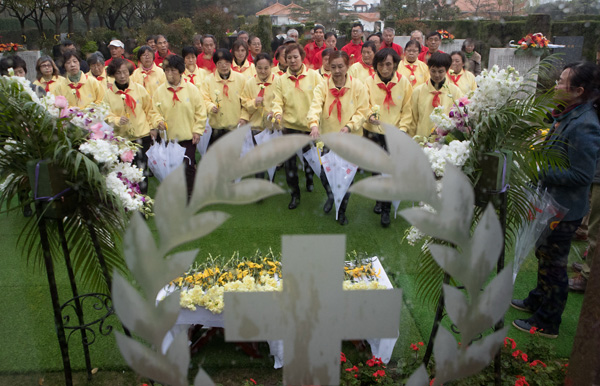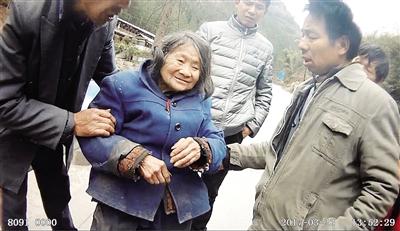The French Embassy in China cited an isolated minor attack on a Frenchman in Shanghai on Friday to warn its citizens in China to be vigilant, considering the fact that a Chinese national was killed by a Paris policeman a few days ago.
|
|
|
Chinese police released a photo showing a Frenchman with a bandaged neck talking to officers. He suffered a slight injury when attacked by a mentally-ill Chinese man in Shanghai on March 29, 2017, leading the French embassy to worry about the safety of its citizens in China in the context of a Chinese man killed by police in Paris a few days ago. [Photo/ Weibo.com]
|
The news section of the embassy’s website on Thursday carried a report that a French national was “violently assaulted” with a knife the previous day in Shanghai. The embassy then posted another news report on Friday that the attacker had been arrested by Chinese police and the Embassy and Consulate General of France in Shanghai were closely following developments in the investigation.
In both news releases, the embassy called on the French community to show the “utmost vigilance and [awareness of] security” in the “current context.”
However, it soon turned out that the attack was not that serious. According to Shanghai police, the unnamed Frenchman was attacked with a razor and suffered a superficial neck wound. The Frenchman then sought treatment at a hospital by himself. There was also a photo released by the police showing the man with bandaged neck talking to officers.
Shanghai police also identified the attacker as a 27-year-old local man surnamed Mao, who suffered mental problems. He is now in custody.
“It is understood that Shanghai police have arrested the suspect and the case is still under investigation,” Foreign Ministry spokesperson Lu Kang said during a press briefing on Friday. “I suggest nobody should rush to make any assumptions.”
The French Embassy had been fearing members of the French community in China might suffer some retaliation from Chinese people due to the incident involving Liu Shaoyao, a 56-year-old Chinese man who was shot dead by a Paris policeman on March 26, triggering protest on the streets of the French capital, and in China, too.
Liu’s family is now refusing to say anything more to the press and the public until the case reaches the courts. Paris prosecutors and the police are still investigating the case to establish the full facts. Two versions are circulating, with the police insisting they were forced to shoot in self-defense,while Liu’s family insist he posed no danger to any policeman.
The Qianjiang Evening News, a local newspaper in Zhejiang Province from where Liu originated, reported the local government of Qingtian County, Zhejiang felt the family’s pain and was closely following the case.
Also, according to a friend of Liu, the Chinese man went to France to work two decades ago and the family was not rich. “The place where they resided in Paris is an average ghetto community of various races with bad security,” he said.
According to Nouvelles D’Europe, many Chinese and Asians told it they felt they suffered from clear racial discrimination from neighbors and police officers in the area. “Fraud and robberies against Chinese are so frequent in Paris, I feel no sense of safety,” said one Asian woman who insisted on remaining anonymous.
The newspaper also reported that, in April 2016, the police brutally raided the apartment of two Chinese female students residing in the 13th arrondissement without finding anything there.
An anonymous hand had written on the wall of their building “Chinese whores, first floor”; When they went to testify, a police officer even told them that, “many Chinese students are prostitutes.”
Last August, Zhang Chaolin, a 49-year-old couturier and father of two who lived in Aubervilliers, was fatally assaulted in the street, due to his origin, by three young people living in the community.
These problems had a negative impact on French-Chinese relations. For example, the number of Chinese tourists in France dropped by 27 percent in 2016 to 1.6 million, compared to 2.2 million in 2015, as travelers sought more secure countries to visit.
France has set a goal of attracting five million Chinese tourists by 2020, but persistent security concerns may prevent the target being achieved.
A memorial event for Liu Shaoyao was approved by Paris police to be held at The Place de la République in central Paris on the afternoon of April 2. Emmanuel Macron, youngest candidate in the race for the French presidency and a former economics minister, met with Liu’s family on Friday and promised to help them.

